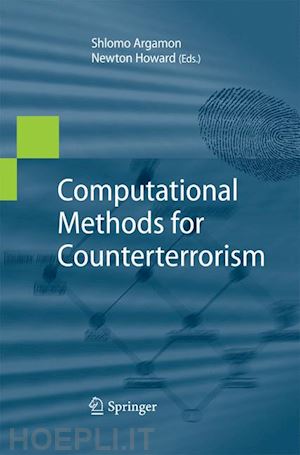
Questo prodotto usufruisce delle SPEDIZIONI GRATIS
selezionando l'opzione Corriere Veloce in fase di ordine.
Pagabile anche con Carta della cultura giovani e del merito, 18App Bonus Cultura e Carta del Docente
Modern terrorist networks pose an unprecedented threat to international security. The question of how to neutralize that threat is complicated radically by their fluid, non-hierarchical structures, religious and ideological motivations, and predominantly non-territorial objectives. Governments and militaries are crafting new policies and doctrines to combat terror, but they desperately need new technologies to make these efforts effective.
This book collects a wide range of the most current computational research that addresses critical issues for countering terrorism, including:
The book’s four sections describe current research on discovering relevant information buried in vast amounts of unstructured data; extracting meaningful information from digitized documents in multiple languages; analyzing graphs and networks to shed light on adversaries’ goals and intentions; and developing software systems that enable analysts to model, simulate, and predict the effects of real-world conflicts.
The research described in this book is invaluable reading for governmental decision-makers designing new policies to counter terrorist threats, for members of the military, intelligence, and law enforcement communities devising counterterrorism strategies, and for researchers developing more effective methods for knowledge discovery in complicated and diverse datasets.
Shlomo Argamon is Associate Professor of Computer Science at the Illinois Institute of Technology, Chicago, IL, USA, since 2002. Prior to that, he had held academic positions at Bar-Ilan University, where he held a Fulbright Postdoctoral Fellowship (1994-96), and at the Jerusalem College of Technology. Dr. Argamon received his B.S. (1988) in Applied Mathematics from Carnegie-Mellon University, and his M.Phil. (1991) and Ph.D. (1994) in Computer Science from Yale University, where he was a Hertz Foundation Fellow. His current research interests lie mainly in the use of machine learning methods to aid in functional analysis of natural language, with particular focus on questions of style. During his career, Dr. Argamon has worked on a variety of problems in experimental machine learning, including robotic map-learning, theory revision, and natural language processing, and has published numerous research papers in these areas.











Il sito utilizza cookie ed altri strumenti di tracciamento che raccolgono informazioni dal dispositivo dell’utente. Oltre ai cookie tecnici ed analitici aggregati, strettamente necessari per il funzionamento di questo sito web, previo consenso dell’utente possono essere installati cookie di profilazione e marketing e cookie dei social media. Cliccando su “Accetto tutti i cookie” saranno attivate tutte le categorie di cookie. Per accettare solo deterninate categorie di cookie, cliccare invece su “Impostazioni cookie”. Chiudendo il banner o continuando a navigare saranno installati solo cookie tecnici. Per maggiori dettagli, consultare la Cookie Policy.